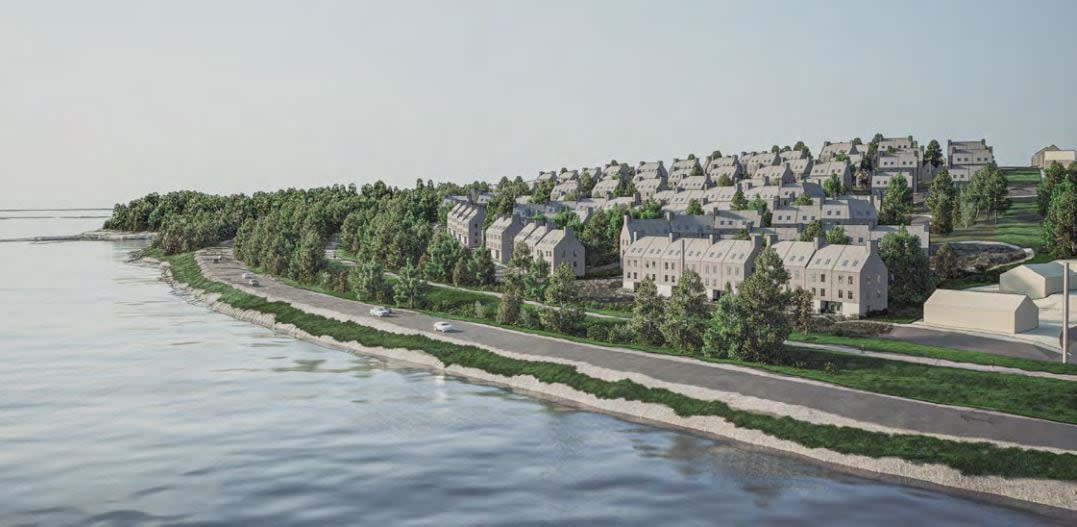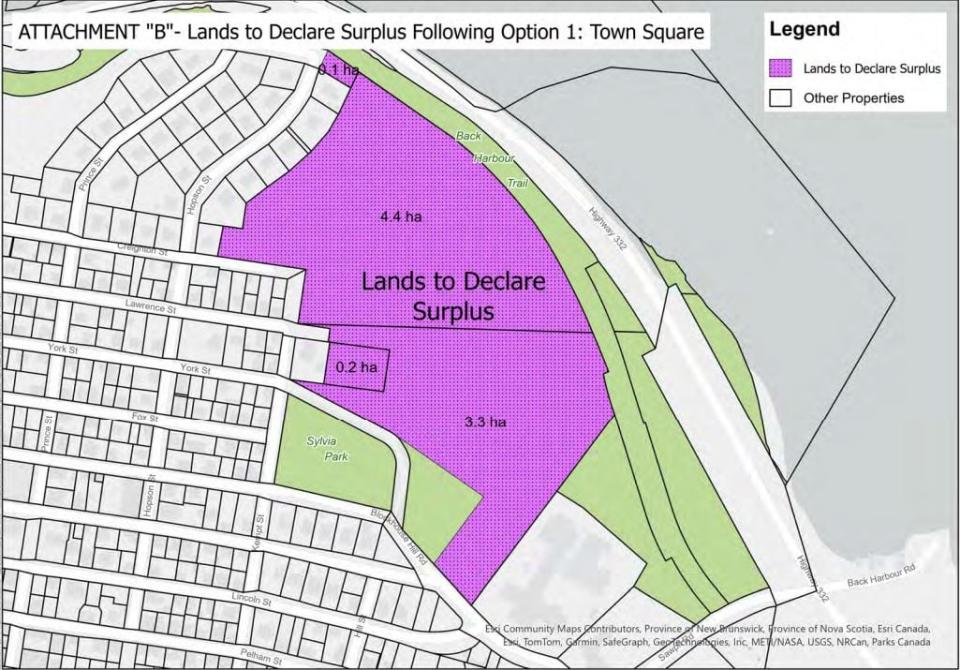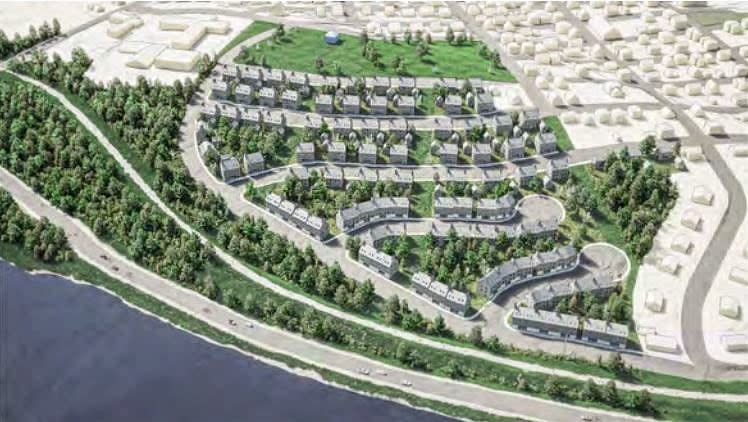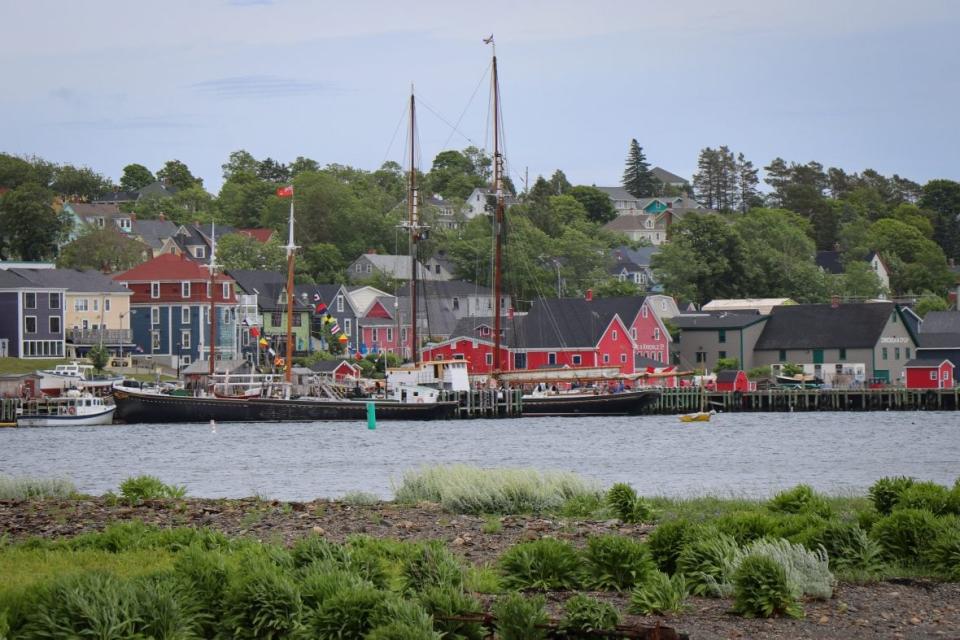Lunenburg moves ahead with planning for up to 368 new homes

Lunenburg's town council will gather more details on what a major new development could mean for local taxes before starting the process to sell public land for the new neighbourhood.
People packed the gallery of the Town of Lunenburg's council meeting Tuesday evening where Blockhouse Hill was on the agenda.
Consultants MacKay-Lyons Sweetapple Architects presented three options of what a new neighbourhood could look like on the back slope of Blockhouse hill, and a fourth option to leave it as a park.
Resident Heather Langille was among the six residents who raised concerns about the plan and called for councillors to consider more information before moving ahead.
"It should stay in public hands and it should not be sold for private interests," Langille said after the meeting.

A map showing the publicly owned land the Town of Lunenburg could declare surplus on Blockhouse Hill. That would allow the town to eventually sell the land for development. (Town of Lunenburg)
The development options have a mix of semi-detached duplexes, townhomes and secondary suites in a stepped design down the slope to the Back Harbour. New roads and pedestrian-only green streets are also included, and all options would not touch the existing RV campground and Sylvia Park.
The number of possible housing units range from none, if the land remains as is, to the highest-density option of 368 units.

Another drawing of the highest-density option on Blockhouse Hill from a higher angle. (MacKay-Lyons Sweetapple Architects)
Municipal staff said during the meeting that selling the land, and adding new taxpayers to the town, will help with Lunenburg's aging infrastructure and housing crunch. A recent town report said it will cost about $46 million to fix 10 buildings in need of maintenance.
A housing assessment for Lunenburg states the town of 2,300 people needs 120 new housing units by 2027, and 170 by 2032 to accommodate its growing population.
But Langille said there are other areas of town "much more suitable" for housing. A petition from more than 700 local residents has asked to pause the project.
Council, based on a suggestion from Mayor Jamie Myra, voted to delay voting on declaring the land surplus — which would allow it to eventually sell the land for development — until March to hear back from staff on the taxes implications.
"We need to have some idea of those costs going forward to make educated decisions … that are better for the residents of our community and I think that's really important," Myra said after the meeting.

Jamie Myra is mayor of the Town of Lunenburg. (CBC)
There will be another public hearing before any final decision is made.
Councillors also directed the consultants to draft development rules for the highest-density option — 368 units with about 36 per cent of the site as park space — which would set out detailed requirements attached to land even after it changes hands.
Consultants have estimated that option would cost about $182 million in construction, labour and water and wastewater upgrades for whoever develops the land.
Coun. Peter Mosher said he'd like to have rules for the "full plan" that could always be scaled down, or built in phases over the coming decades.
Staff had suggested drafting rules for the second-densest option (256 units) which was also the top choice for most people surveyed during the consultant's workshops.

Lunenburg is both a tourism hub and an industrial town with a working waterfront, that's home port to the iconic schooner Bluenose II. (Emma Davie/CBC)
The Friends of Blockhouse Hill advocacy group raised concerns during the meeting, and in a letter to council, about development's impact on the town's UNESCO World Heritage designation. They have also taken issue with how only 10 per cent of the homes would be designated as affordable.
Julian Smith is an expert heritage planner on the consultant's team who co-authored UNESCO's recommendation on the historic urban landscape. He told the meeting all the development options in the buffer zone around Old Town Lunenburg are not highrise or industrial, so they would not hurt its designation.
In fact, Smith said a past chair of UNESCO's World Heritage Committee told him buffer development that helps the Old Town survive as a "healthy community" where locals can afford to live would benefit both Lunenburg and be an inspiration to sites around the world.
Concerns about tourism pressure
Smith said Venice's UNESCO designation, for instance, was put in danger this summer because tourism pressures have pushed affordable housing, and the ability for people to live normal lives, out of the historic city.
"Lunenburg is already feeling the effects of global tourism but those will only increase with time, and that's a very serious threat to the integrity of world heritage sites," Smith said.
But resident and Friends of Blockhouse Hill member, Alison Strachan, said Lunenburg's tourism is seasonal and housing shortages could be reduced by cracking down short-term rentals.
She said town council could possibly look at Halifax's rules requiring that rentals are owner-occupied in most residential zones.
Strachan also said consultation with the Mi'kmaw community is needed, as well as more research into the Indigenous history around the hill which has been largely unexplored.
"We should be the leaders in reconciliation. We are a colonized town — at their detriment," Strachan said.
Myra said he would like the issue to go to a plebiscite in the upcoming October municipal elections.
MORE TOP STORIES

